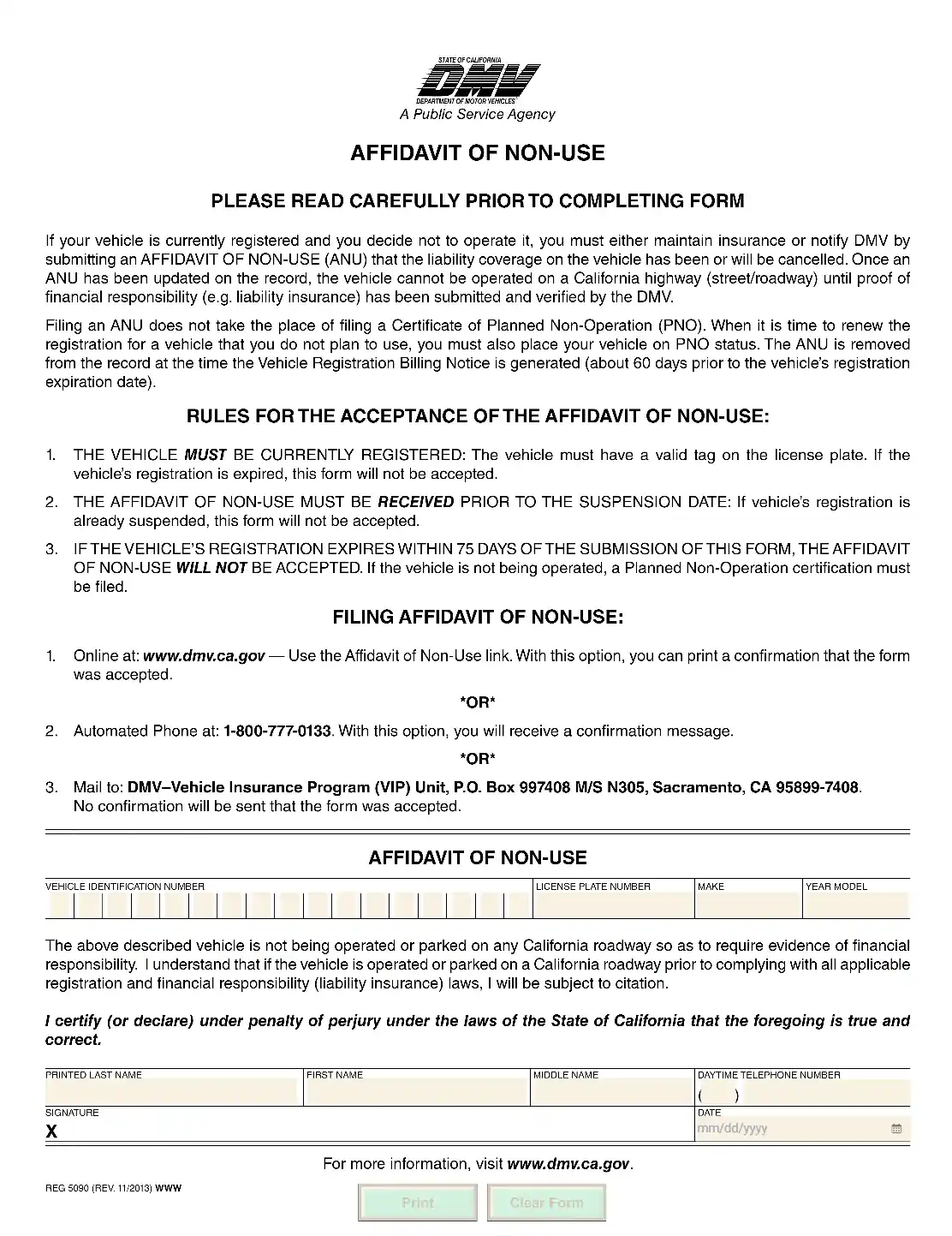A California affidavit of non-use (ANU) allows the car owner to cancel the insurance responsibilities for non-operating motor vehicles without being fined or blacklisted. If the DMV of CA accepts the request, the disclosed automobile or another type of motor vehicle cannot be driven or parked on the state’s roads.
What Is the Affidavit of Non-Use Form?
The printable affidavit form makes it possible for the car owners to officially skip paying for the insurance plans if the subject vehicles are not being used on California roadways. It effectively means that the automobiles and other motor vehicles under discussion cannot be driven or parked on the state’s motorways.
As a matter of fact, all motor vehicles operated in California must be protected by an insurance plan. Otherwise, the owners might become subject to penalties and fines. The ANU measure both protects one’s funds and releases from insurance liabilities when the non-operation status is not applicable.
A non-operation status on a motor vehicle requires that the claimant follows a rather strict application procedure. The drivers get a certain period to manage their requests: the inherent papers must be submitted either 70 days before or 90 days after the registration insurance policy is terminated, leading to the registration suspension.
Unlike the non-registration procedure, the affidavit of non-use opportunity expands the period of limitation for filing the required data. Particular demands must still be accommodated in the process. You are welcome to learn more details in the further sections of our review.
Requirements to Apply for an ANU in California
The California DMV advances specific requirements that allow or bar applicants from submitting an ANU form. If you decide to file the paper with the referenced department, you must follow the below-listed criteria:
- The claimant is expected to have valid registration of the auto disclosed. In case the registration is outdated, the DMV will decline the ANU request. Also, the automobile should possess a particular tag on the license plates.
- You are encouraged to request the ANU before the registration is outdated. Otherwise, the application will be declined.
- The vehicle can not be driven or parked on the state’s roadways onwards of submitting the request.
- The owner should also be aware of having the registration covering 75 and more days after applying for ANU in California.
- Also, the owner must possess a valid insurance plan on the disclosed vehicle. It means that the motor is not suspended because of the outdated insurance policy.
How to File the ANU in California
The California DMV offers several methods to submit the completed ANU documentation.
- Online applications
The applicants are empowered to file the affidavit of non-use online using the link provided on the California DMV official web portal. If you decide to use this means, you are also empowered to print out the confirmation note stating that the request has been accepted.
- By mail
Use the address indicated on the ANU application template to send your request by mail.
- By phone
Vehicle owners who wish to request an ANU confirmation may apply by phone, indicated on the official affidavit form. If they disclose the info via phone, they obtain a confirmation notification. To manage the matter successfully, make sure you have the license plate number, VIN’s last five characters, and insurance policy data on hand.
How to Fill Out a California Affidavit of Non-Use Form
The ANU document is relatively brief, so one isn’t likely to spend much time filling the form out once you have all the inherent documentation to enter. We encourage you to use our advanced online tools to generate and complete the needed PDF file template.
The ANU document consists of two major parts: basic rules and requirements vs. fill-out-section. Read the rules accurately to get acquainted with the focal demands advanced by the DMV in California. Find the affidavit of the non-use template below the double line. We empower you to follow our illustrated guide to eliminate any challenges while preparing a non-operational vehicle form.
Specify the Vehicle ID Data
Use the first empty boxes to enter your motor vehicle’s identification data or VIN.

Submit the License Plate Info
Proceed to enter the vehicle’s license plate data. As you remember, you can only complete a DMV non-operational form if the auto is appropriately registered and the registration is valid over the non-operating period.

Enter the Vehicle’s Specifications
The last two boxes devoted to the vehicle’s info cover such aspects as the make and year model. Enter the required data and proceed to fill in the owner’s ID units.

Identify the Owner
Use the three subsequent boxes to enter the last, first, and middle names of the owner.

Submit the Owner’s Contact Details
Here, the preparer should enter the contact phone details. The DMV representatives may use this info to reach you if any emergency occurs.

Certify the Form
The final step covers the acknowledgment unit. The applicant should append their signature and place the current calendar date. By accomplishing these actions, you certify that all disclosed information is authentic and genuine. Otherwise, the claimant is likely to become subject to fines or other penalties.

